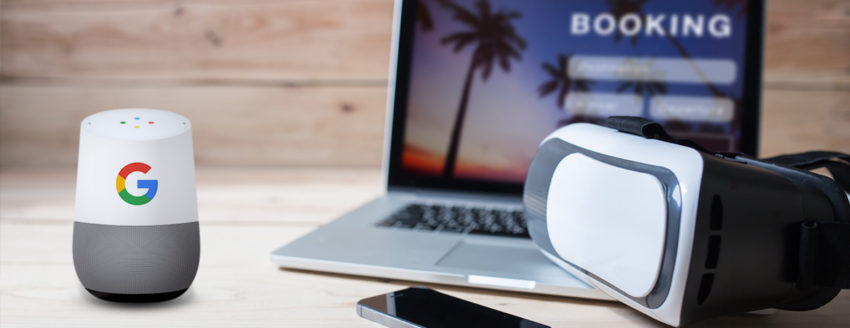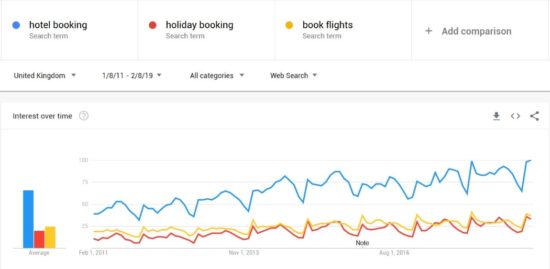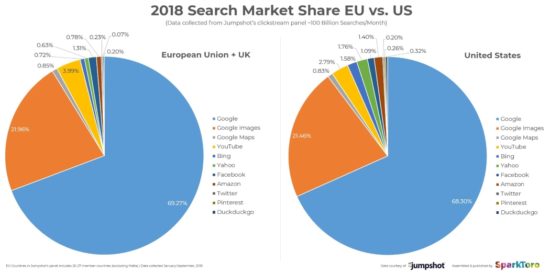Online search demand from users researching and planning their travel has risen over the last few years. At the same time, classic SEO for travel sites is currently undergoing huge changes: Google is integrating an increasing number of its own travel services into its search results, which is turning what was once a search engine into an answer engine. This is also providing the technical requirements for personal assistants and smart speakers that only return one result. Visual search and virtual reality are two other exciting trends that are particularly exciting for SEOs and online marketers in the travel industry.
So … are you ready for tomorrow’s challenges?
Request a free site analysis from our experts!
How people search online for travel information
They say every journey starts with a single step, but nowadays almost every journey starts with an online search on Google, Bing or Yahoo. Search engines have become an important tool for researching travel topics and planning trips. According to Google Trends, for example, user interest in the generic search terms, “hotel booking”, “holiday booking” and “book flights”, has been on the rise since 2011.
This data obviously refers to Google search, and Google is way out in front as market leader. A recently published analysis by Rand Fishkin showed that, between January and September 2018, 96.1% of all web searches in the EU were carried out on Google services.
69% of all searches were done using Google web search, 22% on Google image search, 4% on YouTube and under 1% on Google Maps. The other 4% of searches were mainly conducted using Bing, Yahoo and Facebook, with a few others. In the US, Google is only slightly less dominant, with its properties combining for a total 93.4% of searches.
Search engines generate reach
For travel sites, search engines are extremely important from an economic point of view because they generate reach – reach that results in transactions and revenue. If you look at the online sources of the travel agent TUI, which you can do using SimilarWeb, then you see that 60% of the users on tui.co.uk come from search engines, followed by 33% direct traffic.
But before a user books a trip online, they visit several websites and use several web serivces. On average, a user encounters 700 digital touchpoints. This includes conducting 52 Google searches, looking at five different airlines and closely considering eight accommodation options. These figures are taken from a Google trend study.
The travel websites and services visited are distributed as follows:
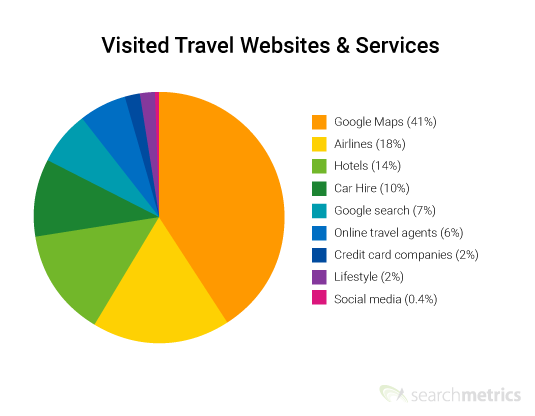
In this context, Google talks about “Micro Moments”, for which Google clusters together search queries that share a user intent and creates a customer journey that the user takes online. It starts with the first thought about travelling and goes through all the steps leading up to booking and then planning the details of the trip.
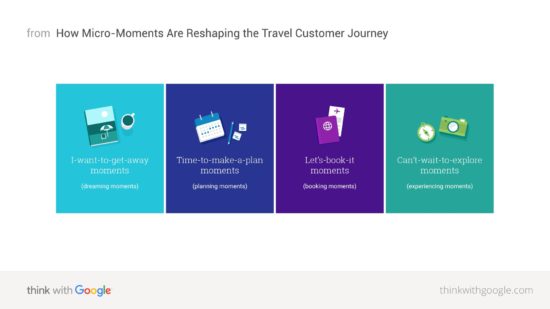
For travel, Google has defined the following four micro moments:
- I-want-to-get-away-moments: At this stage, the user doesn’t have a concrete plan and is looking for inspiration about possible destinations. This includes search terms like “cheap holiday” or “Thailand holiday”.
- Time-to-make-a-plan-moments: Here, the user knows where they want to go and they are looking for suitable flights, accommodation and things to do. This includes searches like “best time to visit Thailand” or “rainy season Thailand”.
- Let’s-book-it-moments: Now the user has finished their research and they start booking e.g. hotels and plane tickets. This includes search queries like “flight Phuket” or “hotels in Phuket”.
- Can’t-wait-to-explore-moments: In this phase, users are already on their holiday and might be looking for things to do locally. This includes search terms like “best restaurants in Phuket”.
If you provide holidays to Thailand, it is essential that your website offers content that will appeal to users at all stages of the customer journey. This means creating content that satisfies the different user intents. A look at the search volume for queries that belong to micro moments at different stages of the sales funnel shows how important this is:
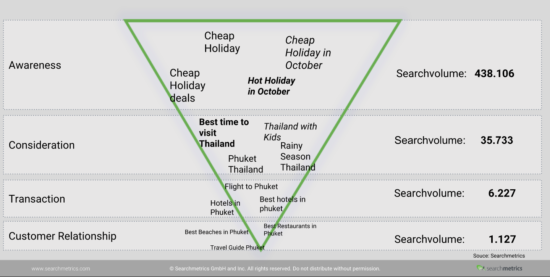
Most companies that provide products or services tend to concentrate on the “transaction” stage of the funnel. But if we look at the search volume, we see that the vast majority of all queries take place in the first two stages (awareness and consideration) – and only a fraction of queries in the purchasing stages (transaction and retention). Neglecting the upper stages of the funnel means missing out on potential reach, customer relationships and revenue.
Online search is changing
Since Google went live in 1997, the way we search has changed dramatically – from one-word searches to complete sentence and question searches; from just web search to video, map and image search. Google hasn’t just created new, independent verticals like Google Maps, Google Video and Google Images, it has also adjusted its algorithm to better serve changing search habits. This is most evident in the switch to Mobile-First Indexing.
As users, we have changed our search habits according to the technology available to us. In the past, we mainly used desktop keyboards to type search terms into Google. This has changed to virtual smartphone keywords and, since 2014, we are now at a point where we can communicate with Google through speech and we can enjoy the support of smart assistants like the Google Assistant or Amazon Alexa by having a Google Home or Amazon Echo in our home. Voice search is currently one of the most relevant trends for the future of online marketing.
Search using a visual input (e.g. a photo) is also an upcoming trend, although this development is still at an earlier stage of its life cycle.
Websites are losing relevance for users
Today, if a travel agency creates and optimizes content for its own website, then it does this because it wants to bring users directly to its website, it wants to inform them and, ideally, it wants to convince them to make a booking. In the future, this travel agency will have to structure and prepare its content more for those platforms where its users are active – this primarily means social media platforms (Pinterest, Instagram, Snapchat), smart assistants (Google Home, Amazon Echo etc), chatbots, virtual reality devices and Google itself.
Google’s transformation to an answer engine
Thinking about the trend towards voice search, we can see – particularly when we look at mobile search results – that Google is undergoing a transformation from search engine to answer engine. This transformation presents a threat to travel sites and their reach.
When a user searches for flights, Google displays offers from different providers, including a price comparison:
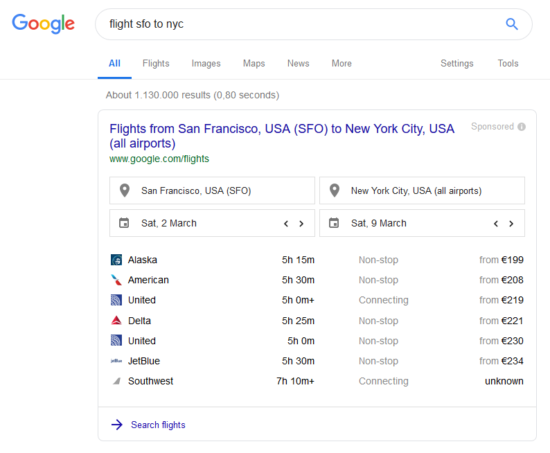
For a search for hotels in a particular city, Google shows different accommodation options, and again includes price information:
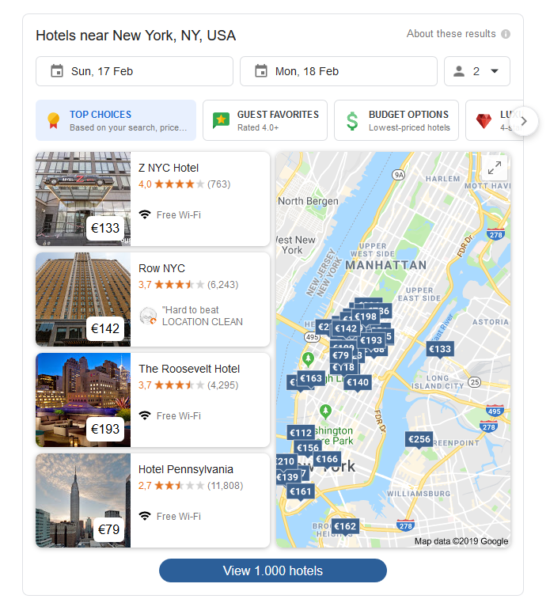
A search for things to do or see in a given city, or even just as search for the city name, will return Google’s own travel guide, including sights and suggested activities.
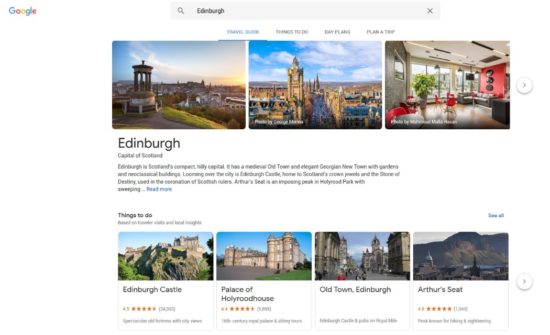 Google shows these results in a structured, highly prominent layout on its search results page. Google pulls the content for these results from various websites and uses this structured form to provide the basis for answers to voice search queries.
Google shows these results in a structured, highly prominent layout on its search results page. Google pulls the content for these results from various websites and uses this structured form to provide the basis for answers to voice search queries.
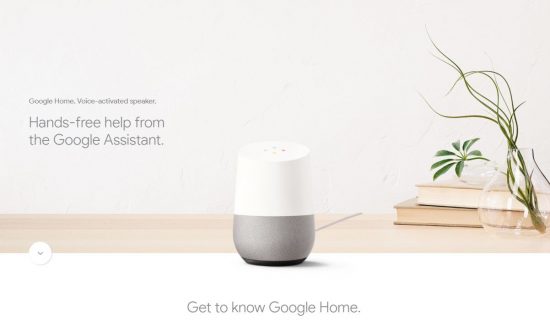
If you ask your Google Home Assistant for a flight to New York, then you get exactly the same result, including all the details on prices and flight durations, that you get when conducting a normal desktop or mobile search.
Content published by travel agents or other travel sites is scraped by Google and then presented to the user so that they don’t have to leave the search results page to access the most important information.
Smart Speakers & Personal Assistants
A forecast published by the website gminsights.com predicts enormous growth in the voice assistant market, with global shipments estimated to reach over 500 million units by 2024.
Devices that, today, are mainly used by early adopters, are expected to be integrated into many objects and devices we use in our daily lives, like cars, fridges and TVs. The car manufacturer, Kia, has already equipped its “UVO” with a Google Assistant. Nissan, meanwhile, has installed its “Nissan Connect” service in several of its models. This service makes it possible to connect the car to Amazon Alexa. There are also fridges made by LG that include Cortana and Alexa integration.
We can already use everyday objects to reserve a table in a restaurant, book a flight or order some milk. This is another example of the available technology changing the way we search.
Voice assistants, like chatbots, are playing a key role in the digitization of the travel industry. In the summer of 2018, Marriot announced a cooperation agreement with Amazon that saw a specially developed voice assistant, “Alexa Hospitality”, installed in all hotel rooms. This lets hotel guests perform tasks like making a spa appointment, calling room service, controlling light, music and temperature within the room, or accessing information about cultural events and nightlife in the city.
Social Media & Visual Search
Social media platforms like Pinterest, Instagram and Snapchat have long become more than a tool for connecting people across the globe. For E-Commerce in particular, social media platforms have become extremely important. A ViSenze study published on Business Wire found that 60% of Generation Z consumers now use social media for shopping. On Snapchat you can already take a photo of a friend’s shoe and be given the opportunity to purchase it directly from Amazon.
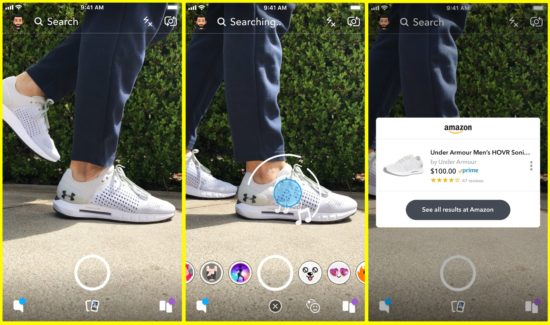
Source: Business Insider
With Instagram Shopping, Instagram has also made it possible to shop within a user’s feed or within a story. With these offerings, the platforms are responding to what Business Wire’s study found to be the technology Gen Z and Millenial consumers want more than any other: visual search capabilites.
The same study also found that 40% of millenial travelers valued how Instagrammable their holiday appeared to family and friends as the most important factor in choosing a destination. The airline, easyJet, has responded to this demand with its Look & Book App. Users can load photos of places from Instagram into the app, which then recognizes the destination and provides relevant flight options.
Virtual Reality
Another visual search trend for the tourism industry could come from virtual reality. With virtual reality technologies, it is possible to send a user to their destination before they even book their trip. This can make it easier for the user to make their purchase decision. Thomas Cook introduced “Try Before You Fly” in 2015. With a virtual reality headset, users could be submerged in a 360-degree video that let them inspect a hotel or take a virtual walk across Times Square.
It is also possible to make direct bookings using VR, as demonstrated by the booking system developed by the Spanish software company, Amadeus. By wearing a VR headset, a user can enter the booking system itself and book a flight, including the selection of times and dates, via a virtual interface. The new form of “visual” search engine also includes the opportunity to reserve a seat and book additional services like car rental, selecting all desired options and conducting the entire transaction process all the way through to making the payment.
For the leisure and travel industries, Virtual Reality is incredibly useful for turning interested prospects into converting customers. In the future, I see VR becoming a potential content marketing measure for all leisure and holiday operators.
Conclusions
- Technological advances will continue to develop at a great speed – likely even more quickly than we are used to. Automated systems and improving artificial intelligence will take the systems we work with to a whole new level. Users and software providers alike will find that new technologies become available with an ever-increasing frequency, which will continually impact user behavior and the way people search online.
- With these developments, the tourism industry, like other traditional industries, faces an enormous challenge. The key to success will be how well companies and employees can adapt to new processes, new technologies and the new expectations that users have regarding the content they consume and the platforms they visit.
- We can already see a few visitors migrating from company websites to smart assistants, and many more to social media platforms or to Google, where users can access required information – or even make a booking – without leaving the platform.
- It will take courage to take up this challenge and experiment with new platforms and technologies. This means changing old structures, (re-)training existing staff and hiring tech-savvy employees.
- If machines and platforms are to be able to interpret content correctly, then technical understanding and know-how are required to prepare and structure the information in a machine-readable way.
These may not be the easiest times for those of us working in search engine optimization, but they are certainly exciting! So … are you ready for tomorrow’s challenges?
